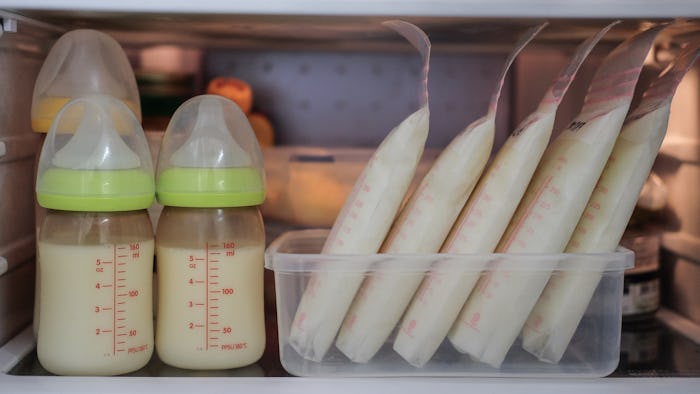Life

Here's What You Need To Know About What Happens To Breastmilk After It's Frozen
Having the ability to store breastmilk is one of the many advantages of parenting in the 21st century. Pumps and freezers make it possible to provide your child with breastmilk even if you can't be there to nurse them at the moment they're hungry, but what happens to breastmilk after it's frozen? There are definitely changes that take place.
First of all, freezing breastmilk is perfectly safe and normal. It gives nursing mothers the ability to leave their children in the care of others for longer periods of time, and it can help those who are unable to nurse through milk donation. And most importantly, it's just as nutritious for babies as fresh breastmilk. "The only downside is that it takes up freezer space," Barbara Cohen, a board certified lactation consultant, tells Romper.
"I have known families that purchase a stand-alone freezer just to store breastmilk." (Though, she adds that isn't usually necessary: "Assuming a full milk supply, a baby who nurses at night [plus] the ability to pump 2-3 times during a typical workday, you will only need enough milk stored for" one day. So you can freeze milk for your little one and still have room for popsicles and leftovers.)
You are changing the milk's state of matter when you freeze it, but the differences between fresh and frozen breastmilk are pretty minimal. As Danielle Downs Spradlin, IBCLC and CLC with Oasis Lactation Services, tells Romper, "Breastmilk is food. It will change in the freezer the same way most foods change in the freezer: turn solid, increase storage time, take on strong flavors or freezer burn if not sealed appropriately." One of the most obvious alterations is that breastmilk expands when it freezes, per the Center for Disease Control, taking up more space than it does when it's in its liquid state. So you won't want to totally fill a container you're using to save milk, as it may overflow as it freezes. Also, Cohen says it's best to "cap the bottles only after the milk has frozen to avoid breakage."
Frozen breastmilk does have a slightly lower number of antioxidants than fresh breastmilk, according to a study in the Journal of Health, Population, and Nutrition. Antioxidants are important for preventing cell damage and encouraging growth, as the National Center for Complementary and Integrative Health explains, so you want to make sure your infant is getting them when they nurse. But the study went onto say that "the values of all nutrients were still within the international reference ranges for mature breastmilk." The difference is minimal enough that it won't impact your baby's health, so you don't need to worry that you're shortchanging your baby if you freeze your milk. They'll still get plenty of nutrients.
Also, make sure you're only freezing breastmilk once. It's completely safe to reheat and serve, but things get a little dicier if you refreeze breastmilk that's already been frozen. La Leche League International, an international organization dedicated to helping mothers breastfeed, reported that refreezing "may introduce further breakdown of nutrients and increases the risk of bacterial growth," which could jeopardize your baby's health. So you're totally fine to pump and freeze, but toss any leftovers your baby doesn't consume after you reheat. Storing frozen breastmilk in small containers will decrease the likelihood of waste. The CDC recommends using 2 to 4 ounce containers that are clearly labeled, and they also note that you shouldn't keep frozen breastmilk for more than 12 months.
Bottom line, frozen breastmilk is just as safe and nutritious as fresh milk, as long as you're following recommended procedures for reheating and serving every step of the way. (I.e., heat the milk using tap water or by boiling, keep note of when you put in the freezer, clean your pump and bottles regularly, wash your hands before handling anything, etc.). Your little one will be just fine.